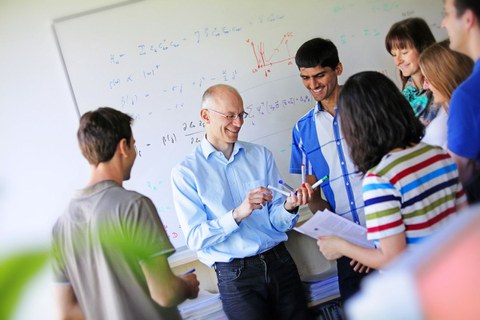Table of contents
Admission requirements
Aptitude assessment procedure
The participation in an aptitude assessment or selection procedure is a prerequisite for enrollment in this degree program. Please note that the deadline for submitting an application may be earlier than the application deadlines for the degree program (see above under application deadlines). The following links will provide you with information on all documents to be submitted within the specified deadline and on the relevant regulations.
Notes on the application process
If, at the time of application, proof of the first degree qualifying the applicant for a profession is not yet available, the application will be considered under the precondition that 80% of the credit points attainable for the degree have already been achieved based on completed module examinations or the final thesis and the colloquium (if applicable). A certification from the awarding institute of higher education (examination office) serves as proof of the above-mentioned academic achievements. You can find the appropriate form on the Admissions Office website.
General information about the degree program
The Master’s degree program in Physics is taught primarily in English. Students may decide if they want to take their examinations for the seminars, practical courses, basic subjects and specialization subjects in English or German. The language of instruction and examination in the non-physics minor subjects is either English or German and is based on the current courses offered in the minor course catalogue. The program can be started in the winter semester or the summer semester. The degree program aims to consolidate insights into interrelations within physics as well as connections to neighboring disciplines.
Collaboration with other subject areas in the natural sciences, technology and the humanities in 12 minor subjects, each with multiple elective topics, guarantees a diverse profile for acquiring a basic understanding of topics in other subject areas and the necessary skills for interdisciplinary work. In one of 5 areas of specialization in physics, students receive a complete overview of established knowledge, new developments and unsolved problems. During the conclusive one-year research phase, they acquire the necessary skills to become acquainted with current topics in physics, to design and conduct experiments or theoretical methods in this field, to categorize the results and to draw conclusions for application to technical developments and scientific progress.
Study contents
An overview of interrelations within physics is provided by the compulsory modules, Experimental Physics and Theoretical Physics. Experimental Physics discusses common principles of solid-state, molecular, atomic, nuclear and particle physics and their different characteristics on various energy scales. Theoretical Physics combines different methods of theoretical physics to produce as complete a theoretical description of physical phenomena as possible.
The elective “non-physics supplementary courses” provide an understanding of issues in another subject area and the skills necessary for interdisciplinary work. These include the minor subjects of mathematics, biomathematics, chemistry, biology, molecular bioengineering, computer science, philosophy, electrical engineering, mechanical engineering, materials science, business administration, and economics.
The Physics Specialization elective compulsory module offers a specialization beyond the established knowledge in current topics of research in one of the five specialization areas of “applied solid-state physics and photonics,” “solid state and materials physics", “soft condensed matter and biological physics,” “particle and nuclear physics” and “theoretical physics.” These typically constitute the special areas in physics from which a topic is chosen in the advanced scientific seminar.
In the Scientific Work module in the first half of the one-year research phase, students apply their theoretical and methodical knowledge to solving a scientific problem in one of the six specialization areas. In the second half of this research phase, they work independently on a scientific research topic as part of their Master’s thesis.
Stay abroad
Would you like to spend a semester abroad? Whether it is a semester, an internship or a language course abroad, you will definitely benefit from the international experience. You can improve your subject and language skills, establish new contacts, make friends, get to know other cultures, and much more. You can find more information on the International Office’s website.
Occupational fields
Basic or industry research, application-based development, technical and administrative planning, quality assurance, consulting, sales, teaching and management (e.g. at teaching and research facilities), in industry and at public authorities
Study documents
The official announcements of TU Dresden include all published regulations . Please use the search bar to find the document you need: Official proclamation
The regulations are also available on each institution’s website.
- Study Regulation
- Examination Regulation
… you will find on the respective site of the responsible unit.
Contacts
Admissions Office
ServiceCenterStudies
Post address:
Technische Universität Dresden
Immatrikulationsamt
01062 Dresden
- Tel.
- +49 351 463-42000
Office Hours:
Faculty of Physics
Academic Advisor
Mr. Dr. Mathias Dörr
Post address:
TU Dresden
Fakultät Physik
01062 Dresden
- Tel.
- +49 351 463-35036
Office Hours:
Please arrange an appointment or visit us during our office hours.
International Office
International Office
Office address:
Bürogebäude Strehlener Str. (BSS) 22, 6. Etage, Raum 671
Post address:
TU Dresden
International Office
01062 Dresden
- Tel.
- +49 351 463-42000
Office Hours:

